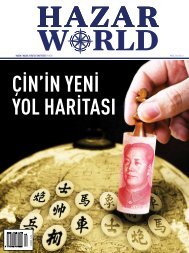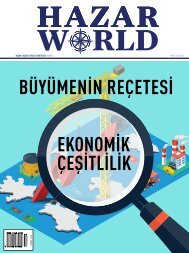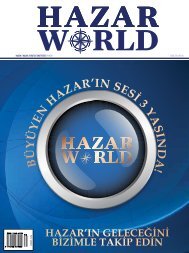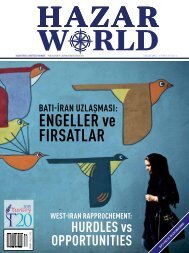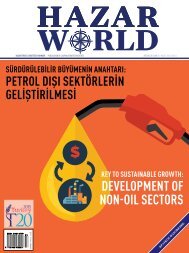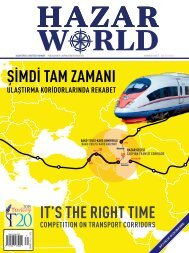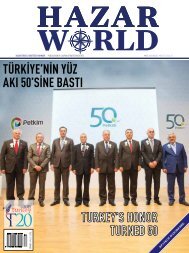Create successful ePaper yourself
Turn your PDF publications into a flip-book with our unique Google optimized e-Paper software.
BLOG / BLOG<br />
ENERJİ GÜVENLİĞİ / ENERGY SECURITY<br />
ENERJI GÜVENLIĞI YENIDEN TÜRKIYE’NIN GÜNDEMINDE<br />
Türkiye-Rusya ilişkilerinin gerilmesi üzerine Türkiye’nin enerji güvenliği<br />
gündemde yeniden geniş yer almaya başladı.<br />
ENERGY SECURITY ON TURKEY’S AGENDA AGAIN<br />
Turkey’s energy security has once again took an important place on the<br />
agenda when Turkey-Russia relations strained.<br />
DR. RÜÇHAN KAYA<br />
HASEN ENERJI VE ULUSLARARASI<br />
İLIŞKILER UZMANI<br />
HASEN ENERGY AND INTERNATIONAL<br />
RELATIONS EXPERT<br />
Türkiye doğal gaz tedarik ettiği ülkelerle<br />
uzun vadeli ve uluslararası<br />
bağlayıcılığı olan anlaşmalara imza<br />
atsa da gaz tedarik etme konusunda<br />
problemler yaşayabileceği ihtimalini de göz<br />
önünde bulundurarak uzun vadeli önlemler<br />
için adımlar atmalı. Zira uluslararası boru<br />
hatlarında gaz kesintisine sebep olabilecek<br />
herhangi bir olay ülkeyi zor durumda bırakabilir.<br />
Geçmişe bakacak olursak, Rusya’nın<br />
Ukrayna’yla yaşadığı gaz krizlerinden sadece<br />
AB ülkeleri değil, Türkiye de negatif anlamda<br />
etkilenmişti. Bu anlaşmazlıklar uzun vadede<br />
Rusya’nın transit ülkeleri tamamen baypas<br />
etme planına ağırlık vermesine yol açtı.<br />
Belarus ve Polonya üzerinden taşımacılık<br />
yapmak yerine 2011 yılında hayata geçirilen<br />
55 milyar metreküp kapasiteli Kuzey Akım<br />
bu stratejinin ilk meyvesi oldu. 2007’de ortaya<br />
atılan ve 2014 sonunda Türk Akımı adını<br />
alan Güney Akım projesi ise Ukrayna’nın<br />
transit ülke rolünü bitirmeye yönelikti.<br />
2019 yılında Ukrayna üzerinden Avrupa’ya<br />
gaz tedarikini sonlandırmayı amaç edinen<br />
Rusya’nın bu amacına ulaşması son dönemde<br />
Türkiye ile arasının açılmasıyla birlikte daha<br />
zor bir hal aldı. Ancak bu gerginliğin sonucunda<br />
iki ülke gaz ticaretine yan etkilerinin<br />
olması ve Türkiye’nin enerji arzında sıkıntılar<br />
yaşama ihtimalini de değerlendirmek ve<br />
buna dair önlemler almak gerekiyor.<br />
UZUN VADELI HEDEFLER HAYATA GEÇIRILMELI<br />
Kısa vadede, yani önümüzdeki kış ve hatta<br />
bir sonraki sene için Türkiye’nin gaz alımında<br />
%55 oranında bağlı olduğu Rusya’ya<br />
ciddi bir alternatif üretebilmesi mümkün<br />
görünmüyor. Ancak uzun vadeli hedefleri<br />
bir an önce gündeme taşımak ve bunların<br />
takibini yapmak gerekiyor. Örneğin,<br />
Hazar gazını Türkiye ve Güney Avrupa’ya<br />
taşıyacak olan Trans Anadolu Doğal Gaz<br />
Boru Hattı (TANAP) Türkiye’nin enerji arz<br />
güvenliği için ciddi önem taşıyor. İnşaatı bu<br />
yıl başlayan hattın ilk gazı 2019’da Türkiye<br />
Turkey should take long term steps<br />
bearing in mind that the country may<br />
face gas supply problems although<br />
it has long term and internationallybinding<br />
agreements with supplier countries.<br />
Anything that may cause an interruption<br />
in the gas flow of international pipelines<br />
may culminate in distress for the country.<br />
In retrospect, we observe that gas crises<br />
between Russia and Ukraine have negative<br />
consequences for not only EU countries<br />
but also Turkey. Such disagreements made<br />
Russia focus on the plan to by-pass transit<br />
countries in the long run. The Nord Stream,<br />
which was put into service in 2011 with a<br />
transport capacity of 55 billion cubic meters<br />
as an alternative to transportation through<br />
Belarus and Poland, was the first outcome<br />
of this strategy. Whereas the South Stream<br />
project, which was first suggested in 2007<br />
and re-named ‘Turkish Stream’ in 2014,<br />
was designed to end Ukraine’s transit position.<br />
Russia intends to stop supplying gas<br />
to Europe through Ukraine by 2019; but<br />
reaching this aim is now more difficult as<br />
Russia’s relations with Turkey have deteriorated.<br />
This tension may have side effects<br />
on gas trade of both countries, and Turkey<br />
may have problems in the energy supply.<br />
In this context, those possibilities should<br />
be taken into consideration and related<br />
measures should be taken.<br />
LONG TERM GOALS SHOULD BE REALIZED<br />
In the short run –for the next winter or<br />
the upcoming year– it does not seem probable<br />
for Turkey to find a real alternative to<br />
Russia which it depends on by 55% for gas<br />
supplies. However, long term goals should<br />
be immediately put forward and followed<br />
up. For instance, the Trans Anatolian<br />
Natural Gas Pipeline (TANAP), which<br />
will transport Caspian gas to Turkey and<br />
Southern Europe, is a significant project for<br />
ensuring Turkey’s energy supply security.<br />
44<br />
<strong>KASIM</strong> <strong>2015</strong> <strong>SAYI</strong> <strong>36</strong> - NOVEMBER <strong>2015</strong> ISSUE <strong>36</strong>




